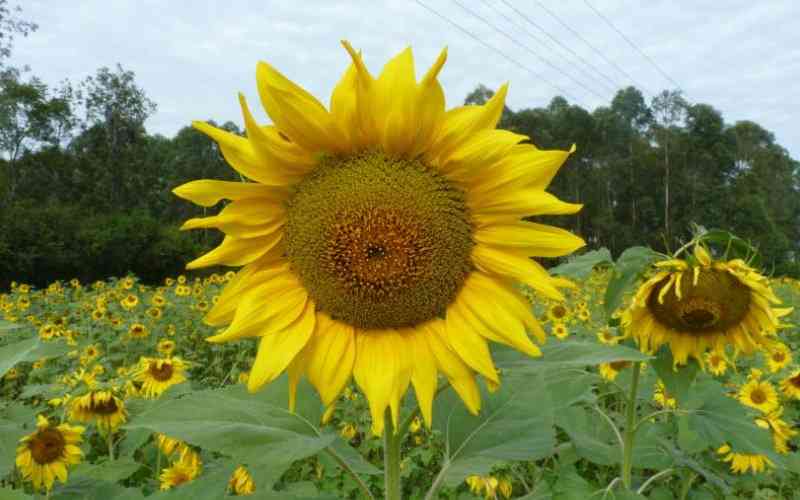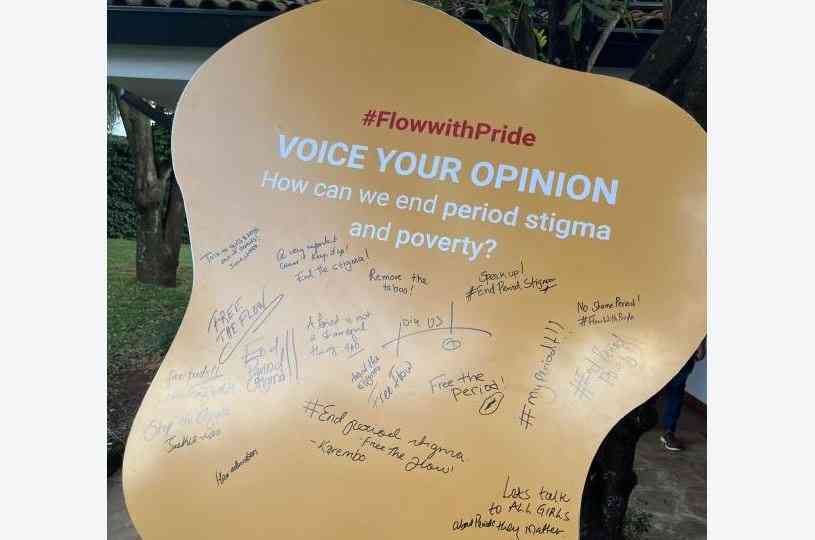
When Paul Ogallo, 45, completed his studies, he did not seek formal employment.
Ogallo, who hails from Rapogi first joined a friend in Seeds of Peace Africa, a non-profit organisation in Nairobi in 2002 before getting a scholarship with Ford Foundation for a Master's degree in the US in 2006.
After his studies, Ogallo created Create, an organisation that would establish modern toilets in schools.
He says the need to sustain the programme birthed sunflower production in 2017.
He named the oil production company Kamida, which means good tidings.
"Kamida came in as we wanted a social enterprise that could support our initiative," Ogallo explains.
For the start, he got capital from his savings, United Nations Children's Fund, Aqua for All, and friends.
"The two organisations gave us the initial capital to organise farmers. The idea was that part of the money we get from sunflower oil production was to help schools sustain the water and sanitation facilities," Ogallo explains.
When starting the mini sunflower oil factory which lies on an acre of land, at Rapogi centre in Uriri sub-County, Ogallo bought a crushing machine and materials for the establishment of a filtration machine.
With the help of his brother Joseph Onywera, an engineer and a co-founder of the company, Ogallo says they designed and made the filtration machine.
Despite having a seven-acre sunflower farm, they had to source for more sunflower seeds from farmers. So far, the company has 200 farmers from Migori and Homa Bay counties who supply sunflower seeds every harvesting season. The majority of the farmers are from Karungu and Gwasi.
Not for faint-hearted
The company buys sunflower seeds from farmers at Sh40 per kilo.
According to Ogallo, an acre can produce about 1,000 kgs of sunflower.
Sunflower, which does not need fertiliser and is a hard crop, takes three months to mature.
He says the plant is not easily affected by diseases and helps bring back nutrients into the soil when grown over the years.
However, it is a favourite for the birds as they attack the plant during the first three weeks of planting. To counter that, farmers are encouraged to do cluster farming.
James Masisa, a crop expert and crops director in Migori County government says that sunflower is planted as any other crop.
"The spacing is done as that of maize," he says, adding that the plant can be grown anywhere, with or without fertilisers.
According to Masisa, those planting sunflower intercrop it with maize.
He says though sunflower is not a labour-intensive crop, the main challenge is attacked by birds.
"Farmers plant but as the crop is about to mature, it is attacked by birds," he says.
Masisa explains that not all sunflower varieties are good for oil production.
To have high production of oil, they use black sunflower seeds.
"We chose sunflower because it is gold," he says.
After harvest, the sunflower seeds are removed from the cob and sun-dried for about a week.
The seeds are then selected to ensure there are no foreign materials and are stored in silos.
After the seeds have been dried, they are taken to a crusher where they are made ready for oil production.
The crushed sunflower seeds are then placed into a centrifugal machine which removes all particles and leaves the oil 'crude oil'.
The crude oil is then poured into sieves where burnt bagasse has been placed to destroy any chemical that might be in the oil.
Oil processing step by step
It is then poured into a container that has activated charcoal which further cleans the oil before it is fed into a de-waxing machine.
After all the wax has been removed from the oil, it is taken to the last stage where it is fed into a filtration machine which has three filter points.
Bottling is done after the filtration, where a tap at the filtration machine is opened to feed oil into the bottles which are later labeled for sale. After doing this, the oil does not have any settlement of particles for as long as two years.
Ogallo explains that the sunflower oil by-products which include crude oil, seed cake, and wax are not discarded but rather used to make soap, animal feeds, and body lotion.
He says the crude oil has medicinal properties and is used to treat various diseases such as hypertension, arthritis, cancer, and ulcers.
The seed cake is usually sold to farmers at Sh40 per kilo as it helps birds in laying eggs and dairy cows in producing milk. The factory crushes a tonne of sunflower seeds, thus producing 300 litres of sunflower oil per day.
From the oil production, Ogallo gets Sh2 million in profits per year, an amount he says can be realised within two months with the supply of more sunflower seeds from farmers. He says they need 1, 000 more farmers to bridge this gap.
"We have been visiting farmers out there and mobilising them to get into sunflower farming but the main challenge has been that even after training, some farmers need support to grow sunflower," Ogallo says.
The Covid-19 pandemic almost brought the company to its knees and management was forced to lay off almost all workers.
"With the support from Aqua for All, we picked up again. We also experienced a loss when two of our farmers who were our key suppliers of sunflower seeds died," Ogallo says.
Today, the company has six board members. Ogallo is a director and founder. The oil is sold locally in Rapogi, Migori, and Awendo towns.
Other sales are done online as they get orders from Nairobi, Mombasa, and Nakuru counties. The oil is sold at Sh350 per litre, which is the factory price.
 The Standard Group Plc is a multi-media organization with investments in media platforms spanning newspaper print
operations, television, radio broadcasting, digital and online services. The Standard Group is recognized as a
leading multi-media house in Kenya with a key influence in matters of national and international interest.
The Standard Group Plc is a multi-media organization with investments in media platforms spanning newspaper print
operations, television, radio broadcasting, digital and online services. The Standard Group is recognized as a
leading multi-media house in Kenya with a key influence in matters of national and international interest.

